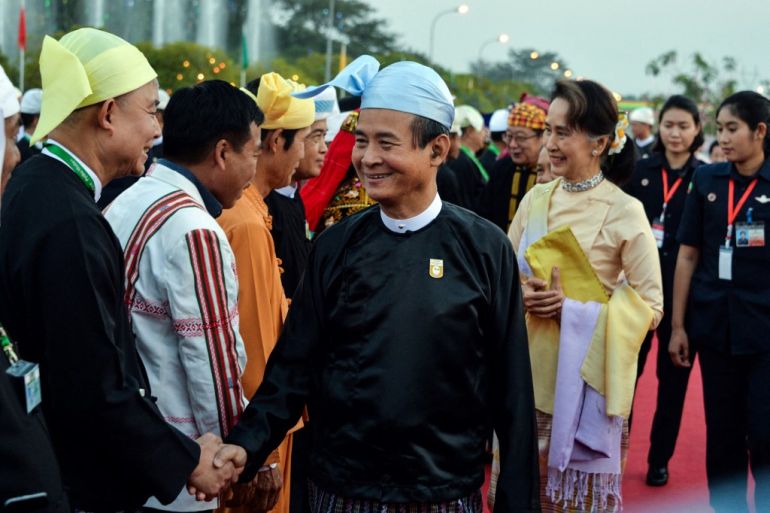Ex-Myanmar president says army tried to force him to cede power
Win Myint’s testimony in court challenges army’s insistence that no coup took place, and that power was transferred lawfully.

Win Myint, Myanmar’s civilian president who was removed from office by the military, has testified that the generals tried to force him to relinquish power hours before the February 1 coup, warning him he could be seriously harmed if he refused, according to his lawyer.
The first public comments from Wim Myint since he was overthrown challenge the military’s claim that no coup took place and that power was lawfully transferred to the generals by an acting president.
Keep reading
list of 3 itemsASEAN could bar Myanmar general from leaders’ summit
ASEAN ‘disappointed’ with Myanmar military’s peace commitment
Win Myint was testifying in court alongside Aung San Suu Kyi, the Nobel Peace Prize winner and de facto government leader before the coup, at their trial on charges including sedition and incitement, stemming from letters bearing their names that were sent to embassies urging diplomats not to recognise the military regime.
Win Myint, who was Myanmar’s head of state, told the court in the capital Naypyidaw that two senior military officials approached him on February 1 and told him to resign, citing ill health.
“The president turned down their proposal, saying he was in good health,” defence lawyer Khin Maung Zaw said in an English-language text message sent to reporters, citing his testimony.
“The officers warned him the denial would cause him many harm but the president told them he would rather die than consent.”
Aung San Suu Kyi is also scheduled to testify for the first time later this month.
A spokesman for Myanmar’s ruling military council did not answer calls seeking comment on Tuesday.
Crackdown continues
Khin Maung Zaw said the defence rejected the charges against Win Myint and Aung San Suu Kyi as they were being held incommunicado.
Win Myint and Aung San Suu Kyi have dismissed multiple charges against them as false. The defence lawyer, representing them both, said Aung San Suu Kyi had suggested Tuesday’s testimony be made public.
Myanmar has been ravaged by violence since the armed forces intervened to prevent Aung San Suu Kyi from forming a new government, three months after her party was re-elected to office in a landslide.
The generals have sought to justify the coup by claiming that the election was marred by fraud, threatening the country’s sovereignty. However, the election commission found no evidence of wrongdoing in the poll.
Multiple anti-military protest columns from Mandalay joined forces today (Oct 12) to stage a demonstration. A protester held up a sign saying, “You have guns. We have belief."
Photos: CJ#WhatsHappeningInMyanmar pic.twitter.com/HKpjXU16fd
— Myanmar Now (@Myanmar_Now_Eng) October 12, 2021
The vice president, Myint Swe, a former army officer, was sworn in as president on February 1 and immediately handed power to the military to oversee a state of emergency.
The generals have not publicly disclosed how Myint Swe assumed the presidency from Win Myint.
The military has been cracking down brutally on dissent – shooting protesters, arresting suspected dissidents in night raids, shutting down news outlets, and rounding up journalists.
On Wednesday, posts on social media showed homes in the Sagaing, Mandalay and Magway regions allegedly being destroyed by the military.
Another post showed an anti-coup night raid in a village in the Sagaing region. At least 10 political activists were also reported to be detained by authorities in Yangon’s Dagon township on Tuesday.
Since the coup in February, more than 1,000 civilians have been killed, according to a local monitoring group.
The special representative of the Association of Southeast Asian Nations has yet to visit the country, and negotiations are still underway for him to meet with the military as well as the opposition leaders.